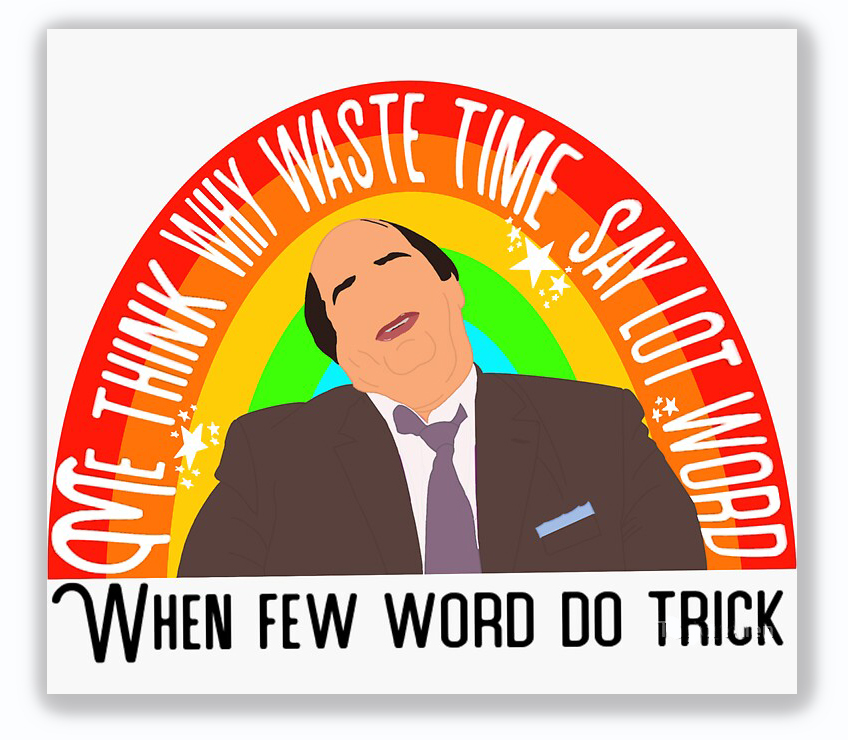We post news and comment on federal criminal justice issues, focused primarily on trial and post-conviction matters, legislative initiatives, and sentencing issues.

WORDS MATTER IN COMPASSIONATE RELEASE DECISIONS
Too Few Words Matter: Legally, there’s no limit to how many times a federal prisoner can file a motion for compassionate release under 18 USC § 3582(c)(1)(A)(i)).
 Practically, however, endless and repetitive motions have the remarkable capacity to really infuriate the judge. Colloquially (and crudely), the correct formula for the number of such filings is
Practically, however, endless and repetitive motions have the remarkable capacity to really infuriate the judge. Colloquially (and crudely), the correct formula for the number of such filings is
JR = POJ -1
where “JR” = Just the right number of filings and “POJ” = Pissed-off Judge
Some prisoners refile compassionate release motions endlessly, often making the same arguments but expecting a different outcome. Judges often just tune them out.
Bob Handlon filed a compassionate release motion that the court rejected because he had not exhausted administrative remedies by asking the BOP to file on his behalf first. Bob fixed that error and refiled his motion.
The district court denied his second compassionate release motion with a brief order saying only, “After considering the applicable factors provided in 18 USC § 3553(a) and the applicable policy statements issued by the Sentencing Commission, the Court [denies] the Defendant’s motion on its merits.”
A year later, Bob filed a third compassionate release motion, mostly rebutting government claims that he was dangerous but also raising new facts, that he had caught coronavirus again and was now suffering lasting medical problems from “long COVID.”
The district judge, who became impatient with Bob pretty early in the game, it seems, merely made a docket entry denying the third motion “for the same reasons stated in the court’s [previous] Order.”
Last week, the 5th Circuit reversed, holding that the district court had abused its discretion. The fact that Bob raised new facts in his third compassionate release motion made the district court’s terse order a little too little.
 “A court cannot deny a second or subsequent motion for compassionate release ‘for the reasons stated’ in a prior denial where the subsequent motion presents changed factual circumstances and it is not possible to discern from the earlier order what the district court thought about the relevant facts,” the Circuit ruled. “Judges have an obligation to say enough that the public can be confident that cases are decided in a reasoned way.”
“A court cannot deny a second or subsequent motion for compassionate release ‘for the reasons stated’ in a prior denial where the subsequent motion presents changed factual circumstances and it is not possible to discern from the earlier order what the district court thought about the relevant facts,” the Circuit ruled. “Judges have an obligation to say enough that the public can be confident that cases are decided in a reasoned way.”
A Lot of Words Matter, Too: Terry Rollins was left a paraplegic after a gunshot wound that cost him his right leg. When he was arrested for drug distribution in 2018, police found him septic and malnourished, lying in his bodily wastes. “But for his arrest,” the court said, Terry “likely would have died of his severe wounds and infections.” His condition was so bad that doctors recommend an operation called a “hemicorporectomy, which would ‘essentially cut him in half to remove the infected part of his body,’” the court said.
Terry moved for compassionate release while still in Marshal custody, arguing that he needed extensive surgery and the Marshal Service had already spent more than $1 million without providing him complete medical care.
 The district court said Terry’s condition was “dire” but denied compassionate release. The court found Terry’s possession of seven guns and ammunition inside his home along with heroin, cocaine powder and crack were “very serious.” Terry argued that he could hardly be dangerous confined to a wheelchair, but the court noted that Terry’s paraplegia hadn’t kept him from armed drug dealing. Because Terry had not shown “he will no longer pose a threat to the public,” the district court denied his compassionate release motion.
The district court said Terry’s condition was “dire” but denied compassionate release. The court found Terry’s possession of seven guns and ammunition inside his home along with heroin, cocaine powder and crack were “very serious.” Terry argued that he could hardly be dangerous confined to a wheelchair, but the court noted that Terry’s paraplegia hadn’t kept him from armed drug dealing. Because Terry had not shown “he will no longer pose a threat to the public,” the district court denied his compassionate release motion.
Last week, the 5th Circuit upheld the denial. The Circuit agreed that Terry had made “a colorable argument. The hemicorporectomy “surgery is rare, often fatal, and comes with various complications, even if the procedure is successful… Mr. Rollins will need around-the-clock care for the foreseeable future… Without this grave surgery, Rollins ‘cannot perform basic functions without assistance.’ Rollins is not wrong to suggest that it seems highly unlikely that he will revert to criminal behavior… [and] contrary to the district court’s reasoning, all this indicates that the prison system is not the place that can provide medical care most effectively.”
“Yet,” the 5th admitted, “the abuse-of-discretion standard is a demanding one. It is not this court’s place to question the reasonable judgment of the district court in assessing the § 3353(a) factors.”
The district court used a lot of words, and adequately explained its reasons for denying compassionate release, the Circuit said.
Under the “abuse-of-discretion” standard, that was enough.
United States v. Handlon, Case No. 22-50075, 2022 U.S.App. LEXIS 31669 (5th Cir., Nov. 16, 2022)
United States v. Rollins, Case No. 22-30359, 2022 U.S.App. LEXIS 31870 (5th Cir., Nov. 17, 2022)
– Thomas L. Root

